“Prava Ludiny” (human rights) monthly bulletin, 2015, #01
Ukraine’s leaders broaden mobilization while refusing to declare state of war Legislating rights abuse in the Crimea Terrorism
At least 12 injured in Kharkiv terrorist act The right to life
Propaganda, distortion and diplomatic silence over Volnovakha shelling The right to a fair trial
“We don’t need a second Yanukovych!” Freedom of expression
Crimean librarian fined for ‘anti-Russian’ books about Holodomor Law enforcement agencies
Suspect wanted for grave crimes against EuroMaidan now suppressing protest in Moscow? Deported peoples
Another Crimean Tatar arrested and beaten over May 3 Dzhemilev protest News from the CIS countries
PACE: Nadiya Savchenko’s health is critical, release her now! Another Russian NGO critical of rights violations branded as ‘foreign agent’ PACE President demands Savchenko’s release. Where next? We remember
Day of Ukrainian Unity and Remembrance for the First Maidan Victims
Politics and human rights
Ukraine’s leaders broaden mobilization while refusing to declare state of war

A new phase of mobilization began on Tuesday, despite Ukraine not officially being at war. This and many other omissions and contradictions could lead to Ukraine losing crucial cases at the European Court of Human Rights.
Ukraine is continuing an ‘anti-terrorist operation’ in eastern Ukraine and there is no formal declaration of a state of war.
This is despite the fact that the National Security and Defence Council [NSDC] and other bodies regularly provide irrefutable evidence that Russian soldiers and Russian military equipment are being deployed in Ukraine. The presence in Ukraine of Russian military technology, arms and men has been confirmed on a number of occasions by NATO and most of its member states, Amnesty International and others. The OSCE Monitoring Mission may be cautious in the language it uses, however it also records clear signs of Russian engagement in Ukraine on a regular basis.
Ukraine’s leaders have asked the international community to declare the self-proclaimed ‘Donetsk and Luhansk people’s republics’ terrorist organisations, but have not done so themselves, even though they are officially carrying out an anti-terrorist operation, not waging war.
Linked and also of great concern is that over two months have now passed since Ukrainians were informed that the government had prepared the documents required to inform the Secretary General of the Council of Europe of Ukraine’s derogation of certain obligations as per Article 15 of the European Convention on Human Rights. This is applied in times of war or other public emergency threatening the life of the nation. Russia effectively invaded and illegally annexed the Crimea, and is now directly, or through heavily supported proxies, playing a dominant role in the military conflict in eastern Ukraine. In these circumstances it remains unclear why the notification of derogation does not appear to have been sent.
‘Mobilization’
On Jan 20 Presidential Decree No. 15/20 ‘On partial mobilization’ came into force, with three phases scheduled over the next 210 days.
Volodymyr Polevyy, deputy head of the NSDC Information and Analysis Centre, explains who is covered, who exempt and that evasion is a criminal offence under Article 336 of the Criminal Code. He criticizes as “legally illiterate” the claim that mobilization can only be mandatory during martial law and says that martial law is not the only condition for mobilization.
Article 1 of the law on mobilization defines mobilization as “a complex of measures taken for the purpose of the planned transfer of the national economy of the state authorities, other state agencies, local governments, enterprises, institutions and organizations on functioning under the extraordinary period, and the Armed Forces of Ukraine and other military formations, Operational Rescue of civil defence - for the organization and staffing of war”.
The decision on mobilization is taken by the President “in the case of armed aggression against Ukraine or the threat of an attack on Ukraine”. The above-mentioned ‘extraordinary period’ begins from the moment that mobilization is announced, and covers the period of mobilization, war and part of the restoration period at the end of hostilities. “Thus the letter and spirit of the Law says that there is an indisputable link between mobilization and the extraordinary period in the state, and also that liable for evading mobilization is possible during this extraordinary period, ” Polevyy concludes.
What is this ‘extraordinary period’, if no state of emergency or war has been declared, only an anti-terrorist operation [ATO]?
Among those warning of problems with declaring mobilization, albeit partial, without a state of war, is Volodymyr Yavorsky, board member of the Ukrainian Helsinki Human Rights Union. He points out that the law on fighting terrorism does not envisage mobilization and is blunt in his assessment of the current situation:
“A country is either at war or it isn’t. It can’t trade with another country while at the same time be carrying out military action against it. This is manipulation of people, since people are fighting while the oligarchs trade and earn money”. He believes that martial law should have been declared since a part of Ukraine’s territory has been seized.
He warns that mobilization summonses can be challenged in court and suggests that such cases have a good chance of succeeding at the European Court of Human Rights since the legal grounds for mobilization are at very least unclear and unforeseeable. He and his colleagues believe that it is important to encourage volunteers now serving to remain and to sign long-term contracts with them, in order to lessen the need for the new mobilization.
Yavorsky is equally scathing of the failure to submit notification of derogation from provisions in the European Convention on Human Rights. At present there are clearly greater restrictions on human rights in the East. Without such notification, Ukraine’s actions will be assessed as though in ordinary peacetime. Back on Nov 14, 2014, the NSDC, and then the President through a decree ordered this derogation documentation to be prepared. The Justice Ministry even did this, Yavorsky says, and passed it to the Foreign Ministry, yet for some unknown reason nothing happened. He calls this “criminal negligence” and warns again that there are already applications lodged with the European Court of Human Rights, and the cost to the state of losses over destruction of property is likely to be enormous.
Lawyer Vladimir Tochilovsky suggests that one reason for the failure to provide this notification may have been the need to define the situation in the zone of conflict and in Ukraine as a whole. Is it an anti-terrorist operation or military conflict, and, if the latter, is it within Ukraine or international?
It may well be, as he suggests, that one ministry cannot deal with the complex issues behind defining the conflict by itself, yet the decision and presidential decree were issued and not implemented.
The problem is not just the likely judgments against Ukraine in Strasbourg. Reluctance to declare a state of war is understandable in situations where anything seems better than the outbreak of military conflict and the inevitable death and destruction as a result. Eastern Ukraine has experienced little but such suffering for many months. Mobilization has not been declared not because of fear of military action, but in the face of it and those who now receive summonses may soon be sent to fight. Failure to officially acknowledge what Ukrainians have been living with since the Spring of 2014 can only arouse distrust and questions about who benefits by not declaring a state of war in which Russia, not isolated ‘terrorists’, is the main aggressor.
Legislating rights abuse in the Crimea

A protester against Russian annexation holds a placard reading: Supporters of Putin: With us you won’t speak Russian, you will be SILENT in Russian! Since annexation there have been serious curbs on freedom of speech and of peaceful assembly
Dozens of laws and normative acts that restrict the rights of people in the Crimea, and five super-dangerous laws. These were the findings made public by the Crimean Field Mission on Human Rights following close monitoring of the first nine months since Russia annexed the Crimea in March 2014.
At a press conference on Monday, the head of the Field Mission Andrei Yurov explained that while the Crimea according to international law remains a part of Ukraine, it is effectively controlled by another country. In these conditions international laws are de facto not working, and all Crimeans, whatever their attitude to annexation and whether they remained or were forced into exile, are hostages to this situation.
The worsening in the human rights situation in the Crimea, Yurov says, is also linked to the fact that Russian laws now in force in the Crimea are harsher than Ukrainian laws. This is particularly evident with legislation on freedom of speech and freedom of assembly.
5 particularly dangerous laws
The Russian laws on strengthening liability for ‘extremism’ and separatism;
Increased penalties for double citizenship;
Laws on legalizing the ‘self-defence’ paramilitary formations;
Ukraine’s law ‘On a free economic zone in the Crimea’
Carte Blanche for armed paramilitaries
The bill, voted on in June, ‘On the people’s militia’ effectively legalizes the paramilitary formation euphemistically called ‘Self-Defence’ which has been responsible for abductions, murders, seizure of property, dispersal of peaceful protests as well as attacks on journalists or simply Crimeans showing their opposition to Russian rule. At the press conference, Olha Skrypnyk noted that the so-called ‘self-defence’ had even received legal entity status in public funding. The law places these paramilitaries under the control of the self-proclaimed prime minister Sergei Aksyonov and the Crimean Council of Ministers.
Skrypnyk pointed out that there has been a significant increase in the number of cases where these paramilitaries take part in seizures of commercial property.
As reported, in October a law was tabled in the Russian State Duma which proposed to waive any liability for these armed paramilitaries up till Jan 2015.
Fortunately that latter bill did not get through, but it is an indicator of the attempts underway to let armed thugs act with total impunity (see: Legislating murder, abduction and land-grabs in the Crimea).
Russian law on extremism
Russia’s law on extremism, as well as its enormous list of prohibited literature, have been used in the Crimea against Crimean Tatars and all those opposing Russian rule.
Dmitry Makarov noted the dangerously wide interpretation given to the term ‘extremism’, and the fact that both in Russia and the Crimea the targets are rather those the authorities deem dissidents, rather than those actually inciting inter-ethnic enmity.
Anti-extremism legislation has been cited and used without any justification since the peaceful protests against the ban on veteran Crimean Tatar leader Mustafa Dzhemiliev returning to his homeland, and especially in the offensive against the Mejlis or representative body of the Crimean Tatar People.
The first warning about ‘extremism’ issued to the Mejlis newspaper ‘Avdet’ was for using words like ‘annexation’ and ‘occupation’; the second – for its reporting the Mejlis’ call to boycott the Sept 14 elections.
The head of the Mejlis, Refat Chubarov was issued a warning over supposed ‘extremism’ following the peaceful protest on May 3, when Mustafa Dzhemiliev was prevented from crossing into the Crimea. At the beginning of July, he was also banned from the Crimea.
There have been frequent searches of homes, mosques and religious schools with the claim being that they are looking for ‘arms, narcotics and extremist literature’ (see Targeting the Crimean Tatar Mejlis as pro-Russian euphoria fades in Crimea and texts below),
The article of the Russian Criminal Code on separatism
This came into force on May 9 and enables imprisonment for up to five years for public ‘calls to separatism’, with this effectively including questioning Russia’s annexation of the Crimea. Makarov explains that it is not clear as yet whether the statement on facebook that “the Crimea is Ukrainian” could be deemed to fall within the scope of the law. The law however does provide a clear signal that it could be dangerous to question whether the Crimea ‘belongs’ to Russia.
Provisions on double citizenship
The new regulations on mandatory notification of holding a second citizenship have been deferred until the beginning of 2016 for the Crimea, however Darya Sviridova from the Ukrainian Helsinki Human Rights Union warns that this could change at any time. Failure to notify of a second citizenship carries criminal liability.
Ukrainian Law on a ‘Free Economic Zone’ and the National Bank Regulation
The Law on making Crimea a free economic zone came into force on Sept 27 despite being condemned by human rights organizations as discriminating against Crimeans and effectively recognizing the Crimea as Russian.
The law (and National Bank of Ukraine Resolution No. 810) declares Crimeans to be ‘non-residents’, envisages the establishment of customs control at the administrative border between the Kherson oblast and the Crimea and contracts between mainland Ukraine companies and those in the Crimea are treated as ‘foreign’ (more details here: Legislative Stab in the Back for Crimeans
The moves have already led to many Ukrainian nationals with Crimean registration having bank accounts blocked, and residents of the Crimea being prohibited from carrying out many financial operations. This is clearly overt discrimination, while the general tenor of both the law and the bank’s resolution are a slap in the face for all Crimeans who, whether as displaced people in mainland Ukraine or as Ukrainians forced to live under Russian rule badly needed support from the Ukrainian government not this.
Halya Coynash
Terrorism
At least 12 injured in Kharkiv terrorist act
 Photo: IT sector
Photo: IT sector
While those targeted in Monday’s explosion were very probably ‘pro-Ukrainian’, possibly members of ‘Right Sector’, the Interior Minister’s adviser Anton Herashchenko and the Security Council seen worryingly quick to attribute blame
The explosion occurred outside the Moskovsky District Court in Kharkiv just before 19.00 on Monday, Jan 19. 12 people were injured, with 1 person in an extremely serious state and 6 others hospitalized, most with serious injuries.
Anton Herashchenko, MP and adviser to the Interior Minister, writes that the blast took place after the end of a hearing in the case of a member of the far-right VO Svoboda Party who is accused of having arrived at a polling station on Oct 26 last year (during the parliamentary elections) with a weapon. The suspect, named only as Mr Sokolov, was remanded in custody, despite calls for under restraint measure to be applied. The explosion occurred immediately after people left the courtroom.
According to IT-Sector all 7 injured are members of Right Sector, though there is no indication of the source of their information.
Virtually all details are in fact provided by Herashchenko and the speed with which the conclusion is reached that Moscow was behind the explosion is somewhat disturbing.
In his first report within an hour of the blast, Herashchenko said that Sokolov’s party affiliation had no bearing on what happened, and mentions only that there was a support group at the hearing made up of “pro-Ukrainian activists”.
At this stage he wrote that “it’s still early to draw any conclusions – whether this is a terrorist act or whether one of the friends of the accused came to the court with a grenade.”
At some later point he added a note saying that “this explosion was a terrorist act planned in advance”, and that the version that this could have been a device brought by one of Sokolov’s friends had proven false.
Exactly one hour after the first message Herashchenko repeated that this was a previously planned terrorist act. He gives reasons for the statement that it was planned in advance, however some of his assertions would surely be better expressed in more cautious terms a mere hour after the explosion.
“After investigators and experts examined the scene of the crime it transpired that along the path leading from the court, there was a concealed explosive device which was detonated when a large group of pro-Ukrainian patriots present at Sokolov’s court hearing on changing his restraint measure passed by.
The terrorists knew that like last time a large group of pro-Ukrainian and patriotic patriots would be present and planned their act in advance.
“I consider this terrorist act to be the answer from Putin and his terrorists to yesterday’s march attended by many thousands of Kharkiv residents against terror”.
He calls on all Ukrainians to rally together in the fight against terrorism and to help the Interior Ministry, SBU and other bodies in preventing terrorist acts.
It is not, however, clear in which capacity he is speaking when he addresses members of the “terrorist gang which organize today’s terrorist act in Kharkiv” and states – in fact, “guarantees”, that the first person to denounce the other members will have liability for the act waived if he shops his accomplices and those who helped in preparing and carrying out the terrorist act.
Soon after this message, Ukraine’s Security and Defence Council issued a statement in which they inform of the explosion in Kharkiv and say that the investigation has been placed under the Council’s control.
The title reads: “Russia is continuing its war against Ukraine, one of the components of which is the fostering of terrorist activity on our territory”.
There are very good grounds for believing that Russia is doing just that (examples here), but such titles so soon after an explosion, however many ‘patriotic Ukrainians’ may have been present, do not inspire confidence in an independent and comprehensive investigation.
Halya Coynash
The right to life
Propaganda, distortion and diplomatic silence over Volnovakha shelling
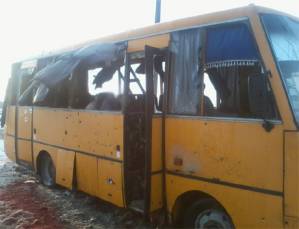
There was a sense of déjà vu on Tuesday night as Kremlin-backed militants and the Russian media went into overdrive attempting to prove that the shelling of a passenger bus near Volnovakha in the Donetsk oblast was somehow or other the fault of the Ukrainian military. The same barrage of conflicting versions was seen after the downing of the Malaysian MH17 on July 17, with not dissimilar prevarication to conceal initial admission. A day later there is no let-up in Russian media distortion, but there is one major difference. All international bodies, including OSCE and Amnesty International, agree on the need for an objective investigation, yet carefully avoid any comment as to who was to blame. The BBC and other western media reports present the Ukrainian side, then the militant denial, leaving out any detail about the labyrinth of different versions from the latter.
Many would question whether responsibility for Tuesday’s attack is any less clear than blame for the MH17 downing, however those with nothing to hide can only benefit from a full and objective inquiry. The OSCE has announced that the militants and Russia will be included in the investigation, and it now remains for them to decide what happened.
Nonetheless, since even the details the OSCE has already confirmed are at variance with the many contradictory versions pushed by militants and Russian media, some attention to all positions seems warranted.
On Wednesday the OSCE’s Special Monitoring Mission issued a spot report from Volnovakha. The report confirms that the bus was hit by shrapnel from a Grad rocket. 10 people were killed outright, 3 more died in hospital and another 16 people were injured.
The mission arrived after being told by the regional traffic police that “a Grad rocket struck close to a civilian bus when it stopped at a Ukrainian Armed Forces checkpoint approximately 2km north of Volnovakha (35km south-west of Donetsk).”
“The bus had shrapnel damage consistent with a nearby rocket impact, estimated by the SMM to be 12-15 meters from the side of the bus.”
This corresponds to a surveillance camera video (mounted on the Donetsk – Mariupol road) which can be viewed here: http://unian.ua/society/1031897-opublikovano-video-obstrilu-boyovikami-blokposta-pid-volnovahoyu-z-gradu.html
Ukrainian government and media reports on Tuesday also called this a direct hit from a Grad rocket, with all adamant that the rocket had been launched by pro-Russian militants based in the nearby town of Dokuchajevsk. Ukrainian reports have largely differed only as to whether the civilians were killed by accident with the target being the Ukrainian army checkpoint, or were deliberately targeted.
The versions emanating from the militants and reported without any hard-hitting questions in the Russian media were much more confused and contradictory.
The militants claimed, for example, that the checkpoint was beyond the range of their artillery. Exactly one day earlier, on the self-proclaimed ‘Donetsk people’s republic’ website they had boasted of hitting that same checkpoint. Screenshots are available should the militants notice that not all media are as willing to accept their versions at face value as pro-Kremlin media sources.
On Tuesday, the Russian TASS press agency reported that “the shelling of the bus was on territory controlled by insurgents of the self-proclaimed Donetsk people’s republic”, citing quoted “a source within the DPR government” for this information. The same source said that they weren’t idiots to shell their own territory.
That would indeed be idiotic, unlike assuming that TASS would not correct the obvious misinformation. The bus was hit while stopped at a Ukrainian military checkpoint.
TASS also reports that “in the DPR defence ministry” they rejected any involvement by the insurgents, claiming this to be “a provocation from Ukraine”.
It does go on to mention that the Donetsk regional head of police asserted “the insurgents supposedly made a strike from Dokuchajevsk at a Ukrainian military checkpoint and hit a bus with civilians”, but then adds that the same head of police “asserted that the wounded had as a result of the shelling been taken to the Volnovakha district hospital. However in the office of the chief doctor of the Volnovakha Central District Hospital they couldn’t confirm this information”.
The TASS report at least mentions other ‘versions’, if only to discredit them. The Russian language Russia Today cites TASS but reports only ‘DPR’ denials.
One particularly curious version supposedly comes from Igor Girkin (nom de guerre: Strelkov) former ‘DPR defence minister’ and identified by US officials as working for Russia’s GRU military intelligence service. He claimed, at least initially, that there were no alternative versions, that the holes came from being shot at by firearms which they’d tried to present as artillery shelling. “I would add there are clear signs specifically of small calibre bullet wounds. The fascists are trying to hide the truth, laying their latest crime on the insurgents”.
This same ‘military expert’ soon opted for another version which appears to be a favourite with Russian television. In the version presented by Russia 24, the Ukrainian military are, of course, still to blame but the stationary bus was supposedly in fact turning when it hit a mine that the perfidious Ukrainians had planted.
“Military experts, having studied video footage from the place of the tragedy have come to the conclusion that this version [Kyiv’s about a Grad missile] is totally without foundation”.
The acting prosecutor of the ‘DPR’ claims that the damage was caused by a land mine. Lest this source be deemed less than objective, we learn from a certain “candidate of military sciences, expert from an association for systemic analysis Alexander Manachinsky, “it does not look like Grad”.
To give this version extra special weight, a sign is shown and even described, saying “Careful, mines!”.
How very unobservant of the OSCE’s mission not to notice.
The right to a fair trial
“We don’t need a second Yanukovych!”
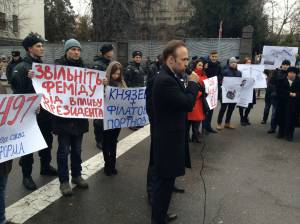 Protest on Jan 12 - one of the placards reads: "Free Femida, or the justice system from Presidential influence"
Protest on Jan 12 - one of the placards reads: "Free Femida, or the justice system from Presidential influence"
Concern is high over a bill proposed by the President’s Administration which critics believe would in fact give Ukraine’s president even more power than that assumed by Viktor Yanukovych during his four years as head of state. “We don’t need a second Yanukovych”, Roman Kuybida, deputy head of the Centre for Political and Legal Reform told protesters on Monday. Yanukovych destroyed any independence of the judiciary, he said, and President Petro Poroshenko is seeking through his bill to do the same instead of using legislation to help establish judicial independence from all branches of power.
The protest took place before a crucial vote on two bills, both of which ostensibly propose judicial reform. The Verkhovna Rada possibly heeded the protests by passing both bills as a base, with the idea being that the two bills would be merged into one, taking the positive aspects of each. It is to be hoped that this can be achieved, however the differences between the two approaches are major.
Bill No. 1497 on amendments to the Law on the Judicial System and the Status of Judges was registered on Dec 17, 2014 and drawn up by specialists and public figures from the Reanimation Package of Reforms. Their aim is to strengthen the independence of courts and make them less susceptible to pressure from politicians and the court management.
Such amendments are desperately needed. Even before Yanukovych’s presidency, the country’s leaders and politicians were all too inclined to exert pressure on the courts. Some of the first ‘reforms’ following Yanukovych’s elections were aimed at increasing pressure on judges. Their ‘success’ was seen not only in the notorious trials of political opponents, but in the fact that Ukraine’s already low rate of acquittals fell to nearly zero, with judges fearing bad consequences if they ‘annoyed’ the prosecutor by finding a defendant innocent. Those judges who towed the line were kept happy by, for example, not having to make their income declarations public, while some experienced meteoric career successes.
Draft law No.1656 , tabled on Dec 27, 2014, , was drawn up in the President’s Administration. According to the Centre for Political and Legal Reform and others involved in the Reanimation Package bill, this bill, if passed, retains all the levers of influence established under Yanukovych and adds some. They include the possibility to: dissolve courts; to sign the identification documents of judges and heads of courts even though the president has nothing to do with appointment of the latter; to accept oaths from all judges to loyalty to the president; and issue decrees transferring judges, including to all highest-level courts. Lesya Shutko from the Human Rights Information Centre reports the result as being that “every step in a judge’s career will depend on the President”.
In earlier comments to Shutko, Roman Kuybida points out that under the Constitution, neither the President, nor the Verkhovna Rada, have the power to transfer judges. Their role is confined to giving them the status of judge, appointing them as judges and giving them indefinite tenure as judges [after 5 years]. The Constitution gives the President the right only to create courts, not to dissolve them.
Kuybida believes it would be better for judges’ appointment to a specific court, as well as any transfer, to be decided not by political bodies, but by bodies of judges’ self-government on the basis of a decision from the Qualification Commission of Judges.
Members of the Reanimation Package of Reforms [RPR] are critical also of plans in the presidential bill to introduce qualification classes and qualifying attestation of judges enabling their demotion or even dismissal. They believe that with the High Qualification Commission already overloaded, they would either turn a blind eye to this, or this could be used in a selective fashion against judges whom the new regime wanted to get rid of. This would be facilitated also by the lack of legal clarity as to the grounds for dismissal for infringement of oath. The presidential bill says “the judge committed acts which disgrace the calling of a judge or undermine the authority of the justice system”.
The RPR bill, Shutko writes, clearly sets out the grounds for disciplinary proceedings against judges, including their dismissal for breach of oath. She says that this would preclude any politically motivated decisions.
Worth noting that the term ‘infringement of oath’ and its use has been repeatedly criticized in assessments of bills by the Council of Europe’s Venice Commission, which points to the scope for abuse.
RPR members believe that the classification classes and attestation should be rejected and warn that they would undermine trust by judges themselves in the High Qualification Commission and from the public. Worryingly, Shutko says that this innovation is supported by heads of the high courts – “those actively involved in drawing up the presidential draft bill”. The innovation would make it possible to get rid of judges where there are no grounds for bringing disciplinary proceedings against them.
Former Constitutional Court judge Mykola Kozyubra is critical of any attempts to enlist judges to carry out judicial reform, as the Presidential Administration is doing. The Administration has rejected the proposal from RPR to move away from having a separate system of economic courts. They point out that these courts have gained the reputation of being the most corrupt body of the judiciary
Another direct clash in approaches can be seen with respect to congresses of judges resolving staffing issues. The presidential bill proposes retaining a centralized procedure for their formation, whereas the RPR bill suggests forming the congress through election of delegates directly via assemblies of judges in each court.
The situation must also be eliminated and at present in the presidential bill is not where the heads of courts decide important issues.
Under Yanukovych, influence on judges was particularly effective through the power given the heads of courts. It was the latter who were particularly instrumental in the repressive rulings, unwarranted detention orders, etc. during the months of the EuroMaidan protests and it was no accident that one of the key moves in cleaning up the judiciary was seen as being a total overhaul of the posts of court heads/ presidents.
The Law on judicial overhaul passed in early April 2014 resulted in all heads of courts and their deputies losing their administrative posts, though of course remaining judges of the relevant courts. The judge corps of each court gained the possibility to themselves elect the court heads and their deputies. It did not, however, establish any methods for ensuring that the outgoing heads and deputies were not simply reinstated via a vote. As reported earlier, it would seem that dirty methods were often applied to ensure that the same judges retained their posts: bribery; spoiling voting papers; pressure on judges. In many courts no alternative candidates were put forward with judges worried about negative consequences if they lost to the supposedly outgoing heads. According to the head of Ukraine’s Supreme Court, Yaroslav Romanyuk, secret voting in courts at all levels resulted in 80% of the cases with court presidents retaining their posts.
The problems, therefore, are clear if any attempts to allow court presidents to retain their dominant role are allowed to slip into the final bill. Ukraine’s recent history makes it just as plain that any efforts to grant elected political leaders power to influence the judiciary are highly retrograde. It is difficult not to agree that those now in power need to be reminded that judicial reform should provide “a response to the main challenge which the public have charged them with – the usurpation by Yanukovych of the judiciary”.
They must not continue the usurpation.
Freedom of expression
Crimean librarian fined for ‘anti-Russian’ books about Holodomor
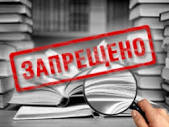 Banned
Banned
Russia’s Sova Centre reports that the director of the Feodosiya Central Library has been fined for supposedly holding ‘extremist material’, in the form of 12 books about the Ukrainian Holodomor, or manmade Famine of 1932/33.
The specific book published in 2007 by Vasyl Marochko under the title ‘Genocide of Ukrainians’: Holodomor 1932/1933’ is on Russia’s Federal List of Extremist Material (no. 1154).
The Feodosiya Prosecutor did not stop at simply quoting the relative number on the list of prohibited materials, but asserted that the book had “an anti-Russian orientation” and used language “aimed at inciting inter-ethnic enmity on the basis of belonging to a particular social group.” The material analysed “contains derogatory descriptions, negative emotional judgements about an ethnic group and individual within in, and calls to incite ethnic enmity which could result in it being used to change mass awareness and serve as the basis for ultra-radical and nationalist views”.
The Director of the library explained that she had only learned in Sept 2014 that the book was prohibited in Russia (unlike in Ukraine) and had not had time to remove it. She was nonetheless fined 2 thousand roubles and the book has been confiscated.
The Sova Centre notes that the book by Marochko was originally removed together with other material during a search of the Library of Ukrainian Literature in Moscow at the beginning of 2011. This was part of a criminal investigation which was finally terminated ‘for lack of elements of a crime’, however a number of books were then added to the federal list of banned material which then contained just 1271 works, and now holds more than double this number.
The books deemed ‘extremist’ included publications about Holodomor as an act of genocide of the Ukrainian people, as well as material about the crimes of the NKVD, the Ukrainian nationalist leader Stepan Bandera, etc. They were all placed on the Federal List on the basis of a ruling of the Meshchansky District Court in Moscow from 01.12.2011.
This is by no means the first time that Crimeans have been penalized over books which are freely published and sold in Ukraine. On a number of occasions there have been armed searches of homes, mosques and religious schools with the FSB and police supposedly looking for ‘arms, narcotics and prohibited literature’. The head of a Muslim school was fined back in August in a case which looked suspiciously like intimidation since the Spiritual Directorate of Muslims had already announced that measures would be taken by the beginning of the new year in September.
It should be stressed that Russia’s list simply needs to be remembered, since many of the works – whether Muslim books of worship or historical books about Holodomor or the Ukrainian nationalist movement – would be most unlikely to be deemed as ‘extremist’ in other countries.
At a press conference on Jan 12, the Crimean Field Mission on Human Rights named Russia’s Law on Extremism as one of the five laws which have had the most detrimental effort on the human rights situation in the Crimea since Russia’s annexation. One of the main reasons is the dangerously broad interpretation given to the term ‘extremism’ and the fact that in the Crimea and, of course, in Russia it is most often used against those the authorities deem dissidents rather than those actually inciting inter-ethnic enmity.
Law enforcement agencies
Suspect wanted for grave crimes against EuroMaidan now suppressing protest in Moscow?

Petro Fedchuk, ex-deputy head of the Kyiv Police on the run from prosecution for the violent dispersal of peaceful Maidan protesters, including on Nov 30, 2013, may now be providing the same services to the Russian police. While others are also continuing to evade justice, some former Berkut officers are fighting side by side with Maidan activists defending Ukraine.
Journalists first pointed out the Fedchuk lookalike at the violent treatment of Muscovites protesting on Dec 30 against the sentences passed on leading opposition politician Alexei Navalny and his brother Oleg. 8.38 minutes into the video below, Fedchuk’s face can be seen among the police officers suppressing the peaceful protest. He has the stripes for the rank of colonel, and the word ‘police’ can be seen when he turns around.
https://youtube.com/watch?v=P17kbMAtDFg
Whether he was in charge of the dispersal of protesters on Dec 30 is unclear, but Fedchuk is suspected, together with his boss Valery Koryak of having unlawfully obstructed demonstrations and used physical violence during the EuroMaidan protests. Koryak and Fedchuk disappeared on March 5 2014 and were placed on the wanted list by the SBU [Security Service] in April.
According to Ukrainian human rights activist Taras Hatalyak, Fedchuk answered for public order and played an extremely active part in the attempts to stop the protests in Kyiv through the use of force. It was his head that would roll if he didn’t.
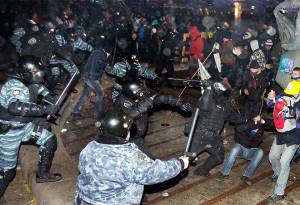 30 Nov 2013
30 Nov 2013
Hatalyak says that Fedchuk was in charge of the bloody dispersal of young protesters, many of whom had been fast asleep, at 4 a.m. on Nov 30. His organization of lawyers for the victims of police violence believe that criminal actions were initiated by Fedchuk on a number of other occasions, and that these possibly included the attack by Berkut riot police and Interior Ministry forces on Maidan on Feb 18, 2014.
HromadskeTV journalist Anastasia Stanko told Open Russia that she is not in the least surprised that Fedchuk should have turned up in the Russian police with whom he may well have had good ties. “After all, he knows well how to be in charge of beating people up and organizing acts of provocation”. And he knows that he faces criminal prosecution in Ukraine.
Stanko was asked whether she thinks many police were prepared to go and serve another country’s police force. Her answer now, she suggests, would be different from back in February last year when she had seen only police brutality in the service of the old regime. What changed was the war in which many police officers, including former Berkut officers, went to fight for Ukraine. “Somewhere inside them a change began”, she says. Before Slovyansk was liberated in May, there were former members of the Maidan Self-Defence fighting side by side with ex-Berkut officers. Somehow they found a common language, “and now if you ask them why they’re here, in the ATO [anti-terrorist operation] zone, they answer “but it’s simple, I gave my oath to the Ukrainian people”.
Yes, there are some ex-Berkut people who fled to Russia or the Crimea and are working there, but the majority, she believes, have changed their position. Berkut officers had been brainwashed. One ex-officer, talking to National Guard members who had been on Maidan, told them: “They kept telling us that you were the dregs of society, whereas you are warriors”.
Against them are what she estimates as up to one thousand members of the enforcement bodies under ex-President Viktor Yanukovych who may have fled to Russia. A considerable number – perhaps 10 percent – went to the Crimea after Russia’s invasion, and, of course, there are also some who are fighting with the Kremlin-backed militants of the so-called Donetsk and Luhansk ‘people’s republics’.
Of the people at the top under Yanukovych, most are believed to be in hiding in Russia. In fact over the last week it has been learned that ex-Interior Minister Vitaly Zakharchenko has taken Russian citizenship as well as a job in Russian Technologies, a state structure headed by a close associate of Russian President Vladimir Putin. Zakharchenko is accused by Ukraine of crimes against humanity in connection with the gunning down of unarmed protesters on Feb 20, 2014. The charges are no less serious against others, including Yanukovych and fugitive ex-Prosecutor General Viktor Pshonka, to whom the Kremlin has seen fit to provide shelter.
Deported peoples
Another Crimean Tatar arrested and beaten over May 3 Dzhemilev protest
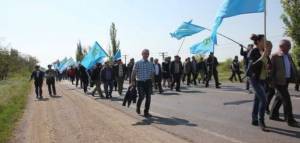
Edem Osmanov whose father, Mustafa, earned fame and gratitude last December when he brought ingredients from the Crimea to cook pilaf for freezing EuroMaidan protesters has become the fifth Crimean Tatar to be facing dubious charges over the peaceful protest on May 3 when veteran Crimean Tatar leader Mustafa Dzhemiliev was prevented from entering his homeland.
Osmanov was arrested on Jan 19 in Chernomorskoye and taken to the SIZO [remand unit] in Simferopol. He is the fifth person to be detained after more than half a year on charges of using force against a police officer during the meeting with Mustafa Dzhemiliev on May 3 last year.
Emil Kurbedinov who is representing the other four men accused has seen Osmanov and plans to talk with his family about representing him as well. All others, as reported here, were initially remanded in custody for 2 month periods but Kurbedinov has succeeded in getting them released pending trial.
Zair Smedlyaev, head of the Central Election Commission of the Qurultay or Crimean Tatar National Congress and the brother of one of the five men facing charges, says that Osmanov reports that the police beat him after he was detained. Smedlyaev calls this latest arrest “continuation of the campaign at intimidating the Crimean Tatars”.
That view is shared by Eskender Bariev, one of the heads of the Crimean Tatar Rights Committee. He points out that they have now arrested the son of one of the activists of the Crimean Tatar national movement and calls the arrests a message to Crimean society and a mechanism aimed at breaking socially active people with their own point of view and making them less active. His committee is working, he says, to ensure that the entire world learns of all these violations.
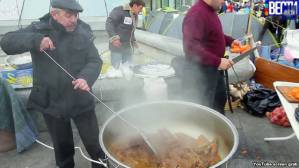
Edem Osmanov is the son of Mustafa Osmanov, a Crimean businessman who became well-known beyond Crimea in December 2013 when he drove his car, packed with food items to Kyiv in order to cook pilaf for EuroMaidan protesters. The family home was subjected to a search under the Russian occupation in September 2014 on a strange pretext having nothing to do with the present case.
The ‘Case’
After the 5-year-ban on Mustafa Dzhemiliev entering the Crimea, announced in April then denied, was enforced on May 2, the Mejlis cancelled all events linked with a spring festive holiday and invited Crimea Tatars to come to the Armyansk border crossing between mainland Ukraine and the Crimea.
Around 5, 000 Crimean Tatars and other Ukrainians appalled by the ban came to meet Mustafa Dzhemiliev who arrived by car from Kyiv. There was certainly a very tense standoff with the occupation regime in the Crimea deploying large numbers of OMON riot police and others to prevent the 71-year-old from entering his homeland. There were no major incidents, however, and it was decided, specifically to avoid likely bloodshed, that Mustafa Dzhemiliev would return to Kyiv. There were protests during that day with some Crimean Tatars briefly blocking a few roads.
Since that time, the occupation regime has fined a number of Crimean Tatars on administrative offences. The so-called Prosecutor Natalya Poklonskaya issued a formal warning to the head of the Mejlis, Refat Chubarov about supposed “extremist activities”. In a verbal warning that she refused to give in writing, although claiming it could be appealed, she threatened that “if the Mejlis does not stop its extremist activities. … it will be dissolved and prohibited on the territory of the Russian Federation.” She also announced that she was sending the Russian Investigative Committee and FSB documents to initiate criminal proceedings over what she termed “unlawful public protests of an extremist nature”.
There was no mention of any physical violence against a police officer, yet since October 4 Crimean Tatars have been arrested and remanded in custody for 2 months.
After varying periods in detention, Tair Smedlyaev, Musa Alkerimov, Rustam Abdurakhmanov and Edem Ebulisov were released from custody but are still facing the highly dubious charges.
The blurred line between accusations of ‘extremism’ and charges linked with one peaceful protest was most evident in the initial court hearing after Tair Smedlyaev’s initial arrest. Although supposedly suspected of using force against a police officer, his original detention was ‘explained’ by the court as because of the prosecutor’s claim that 60 people had asserted that Smedlyaev was an ‘extremist’.
Among those summoned for questioning over the so-called 3 May ‘case’ was 80-year old Vedzhie Kashka, a veteran of the Crimean Tatar national movement.
Halya Coynash
News from the CIS countries
PACE: Nadiya Savchenko’s health is critical, release her now!
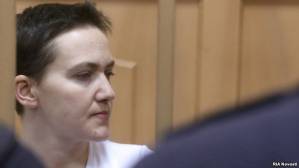
Anne Brasseur, President of the Parliamentary Assembly of the Council of Europe [PACE] has called on Russian State Duma Speaker Sergey Naryshkin to assist in securing Nadiya Savchenko’s urgent release. Ms Brasseur asks for the former pilot, now Ukrainian MP and PACE delegate to be released in time for the opening of the PACE session on Jan 26 and stresses that the Minsk Protocol which Russia is a party to foresees “the immediate release of all hostages and illegally held persons”.
“I therefore kindly ask you to take measures with your authorities to secure her urgent release under the Minsk Protocol or on humanitarian or other grounds.”
Interestingly, the state-owned agency RIA Novosti has immediately reported this appeal without any distortion or extra commentary. As reported here, state-controlled media in Russia have largely kept silent about the case, especially since Nadiya Savchenko went on hunger strike on Dec 13.
The appeal from Ms Brasseur comes a day after Nadiya Savchenko’s lawyers again submitted an application for their client to be allowed to attend the PACE session and Vera Savchenko was finally allowed to visit her sister.
Despite the visit having been agreed in advance, the investigators were not prepared to make anything easy. One of the defence lawyers, Ilya Novikov told Radio Svoboda that when Vera Savchenko arrived in the morning at the Investigative Committee to receive the necessary permit, signed the previous day, they refused to give it to her, demanding that she first give testimony herself. All of this lasted three hours with Vera Savchenko refusing to undergo interrogation and asking for a lawyer. In total breach of Russian legislation, the Investigative Committee officials refused to allow a lawyer to be present.
Fortunately, somebody must have understood the scandal that this would cause and finally relinquished the necessary permit.
Vera Savchenko in turn told Radio Svoboda that the hunger strike that her sister had now been on for over 38 days had had a severe effect on her sister’s physical state and that it was very distressing to see her in such a state. She said, however, that her sister was very animated and interested in everything that was happening in Ukraine and with people close to her. “Everything’s fine with her mood, she’s just very angry and you can feel her permanently boiling over the injustice around.”
Vera’s attempt to persuade her sister to give up her hunger strike also failed. One of the lies attempted by those pro-Kremlin media that even mentioned Savchenko’s hunger strike last weekend was that she had said that she would not eat until the middle of February.
This is untrue, and the reason for the grave concern and unsuccessful calls to stop from Ukrainian clergy, politicians, her defence lawyers and now her sister are that Nadiya Savchenko has clearly stated and even written in a letter to all those concerned about her situation, that her hunger strike is indefinite.
“I am very aware of your concern and feel ashamed that from prison I myself can do almost nothing. I have therefore decided to fight in the only way available to me – through hunger strike….
Through my protest – my hunger – I wish to achieve common sense from the Russian authorities and an awakening of conscience from the Russian Investigative Committee. There is irrefutable evidence of my lack of involvement and innocence of the crimes they accuse me of. What else do they need?
I have taken the decision to go on hunger strike myself and nobody pushed me into it. I have given my word that “Until the day I return to Ukraine, or until the last day of my life in Russia!” and I will not back down, otherwise what value would my words have?!” (her letter in full, together with brief details about the case, can be read here).
The petition addressed to Ms Brasseur asking that she demand Nadiya Savchenko’s release and that her case be placed on the agenda for the first day of the next PACE session on Jan 26 has now gained well over 5 thousand signatures and can be found (and still endorsed!) here: https://change.org/p/president-pace-anne-brasseur-urge-russia-to-release-nadiya-savchenko
The appeal was passed to the PACE President with the first 3 thousand signatures during her visit on Friday, Jan 16.
There have now been public calls for Nadiya Savchenko’s immediate release from the US State Department, the European Parliament and PACE.
The Russian authorities have only a few days to respond adequately and in compliance with both the Minsk Protocol and international law before the PACE session on Jan 26.
If they prove unable to do so, a major campaign is planned throughout the world in support of Nadiya Savchenko on Jan 26. Please see some ideas here.
Please also consider writing to individual members of the PACE asking them to raise questions about the case (ideas and emails here).
In awareness of Russia’s draconian rules largely prohibiting peaceful protest, Nadiya Savchenko and her defence lawyers have called on supporters in Russia to hold their actions to #Free Savchenko online.
Please join them and all concerned for Nadiya Savchenko’s health and her swift return to Ukraine now and especially on January 26!
Another Russian NGO critical of rights violations branded as ‘foreign agent’
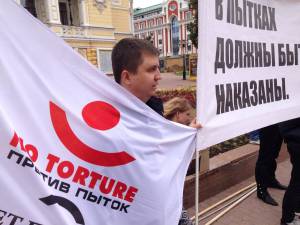
Russia’s justice ministry has forcibly added two more NGOs – the Committee against Torture in Nizhny Novgorod and the Memorial information and education centre in Yekaterinburg - to its notorious register of ‘foreign agents’. As in other recent cases, at least one of the organizations has openly expressed concerns over Russian human rights abuses.
The Committee against Torture
Measures against the Committee began after its criticism of Chechen leader Ramzan Kadyrov’s response to the Dec 4 attack by militants on Grozny which left 14 police officers dead. Kadyrov basically called for relatives of alleged militants to be exiled from Chechnya and for their homes to be destroyed. He is reported to have claimed that holding parents and neighbours answerable was in line with the ‘norms of Islam’.
Nor, seemingly, did he confine himself to words, with a number of homes of people suspected of involvement having been razed to the ground. In the village of Yandi where several houses had been burned to the ground the BBC spoke to the owner of one of them. She said that her son had joined the rebels two years before after having been detained twice, sentenced two times, and tortured many times. She told them that it was this constant treatment that had prompted her son to join the rebels. In fact, her son’s name was not on the list of militants involved in the attack, although not all those killed have been identified.
As reported, a draft bill was submitted to Russia’s State Duma on January 12 calling for heightened punishment of those convicted of ‘crimes of a terrorist nature against public security’ and extending criminal liability to parents and close relatives if they were deemed by a court to have provided assistance ‘in any form’ to militants.
Igor Kalyapin, head of the Committee reacted immediately to Kadyrov’s threats and turned to Russia’s Investigative Committee and Prosecutor General for their assessment of the Chechen leader’s words.
Soon afterwards a fire broke out in the Committee’s Grozny offices, and staff of the NGO were detained and searched. On Kalyapin’s facebook page, he writes that the prosecutor’s statement read that members of the Committee had publicly circulated information about specific negative instances of police work and of the incompetence of the Investigative Committee. In so doing, according to the prosecutor (O.Y. Ponasenko) they had tried to change state policy, and therefore the Committee against Torture was a ‘foreign agent’.
There is less of an overt cause and effect link in the branding of the Yekaterinburg Memorial a ‘foreign agent’, although the persistence with which the justice ministry has ignored previous court cases in the NGO’s favour and continued until an appeal court on Dec 22, 2014, found in the ministry’s favour.
The head of the NGO, Anna Pastukhova considers the move to be commissioned as part of repressive measures against inconvenient NGOs. She is adamant that her organization will fight the decision all the way to the European Court of Human Rights, if necessary.
In December 2014, almost exactly 25 years after the death of Andrei Sakharov, physicist and Nobel peace laureate, the Sakharov Centre [officially the Public Commission for the Preservation of the Legacy of Andrei Sakharov] was forcibly added to the register of ‘foreign agents’, together with the Kaliningrad Human Rights Centre and Krasnodar Regional Organization of University Graduates.
Alexander Cherkasov from Memorial called the move against the Sakharov Centre “symbolic in its madness”, and pointed out that the unscheduled ‘check’ on the Centre began on Dec 13, the 25th anniversary of Andrei Sakharov’s death.
As reported earlier, although there is little information about the other two NGOs, it may be significant that the move comes soon after attempts to hold peaceful protests / calls for greater autonomy were crushed (see Federalization as a terrorist act).
There are now a formidable number of NGOs added against their will to this register, but perhaps the clearest motivation (before that of the Committee against Torture) was seen at the end of August last year with the branding of Soldiers’ Mothers in St. Petersburg a ‘foreign agent’.
This came at the end of a week in which the NGO had spoken out over Russian soldiers being killed fighting in Russia’s undeclared war in Ukraine. At the time, Amnesty International stated that “Russia’s official branding of a civil society organization as a “foreign agent”, an expression akin to “spying”, for speaking out on Ukraine is a sign of the country’s determination to suppress any information about its military activities there”.
There have been other measures against NGOs over the last 6 months or so. In November the justice ministry began an unscheduled ‘check’ of one of Russia’s most well-known organizations, ‘For Human Rights’. The NGO’s head Lev Ponomarev said that the check as to whether the rights organization should be forcibly labelled a ‘foreign agent’ had been asked for by the Prosecutor General’s Office.
The law obliging non-commercial organizations receiving grants from abroad and engaging in what the law very loosely describes as ‘political activities’ to register as ‘foreign agents’ was adopted in 2012. The law was boycotted by a lot of civic organizations, so in June 2014 President Vladimir Putin signed into force a law which allows the Justice Ministry to forcibly include organizations on the register. This it has been doing ever since.
In November 148 Russian and international NGOs addressed an open letter to Russian President Vladimir Putin demanding that the law ‘on foreign agents’ be revoked. There has been no formal answer, however the latest moves appear to demonstrate that the Kremlin has no intention of renouncing laws like those on ‘foreign agents’ and ‘extremism’ which it uses to intimidate and weaken voices of protest, including those defending the most fundamental rights being flagrantly violated in the Russian Federation.
PACE President demands Savchenko’s release. Where next?
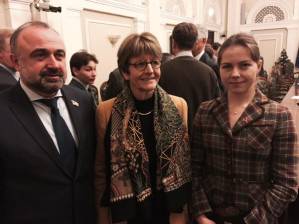
During meetings on Friday with President Petro Poroshenko and other top government figures, Anne Brasseur, President of the Parliamentary Assembly of the Council of Europe (PACE) pointed out that one of the elements of the Minsk protocol was for the “immediate release of all hostages and illegally held persons”.
“In this respect, ” she said, “I call for their immediate release, and amongst these persons I include the pilot Nadiya Savchenko, who is currently held by the Russian authorities. Ms Savchenko has now been appointed to the Ukrainian delegation of the Parliamentary Assembly and there are many grounds for her release, not least humanitarian, as her health continues to deteriorate as a result of her hunger strike.” Ms Brasseur said she would be taking up this issue with the Russian authorities.
Ms Brasseur had been handed a copy of the petition here https://change.org/p/president-pace-anne-brasseur-urge-russia-to-release-nadiya-savchenko which at that stage had gathered 3 thousand signatures.
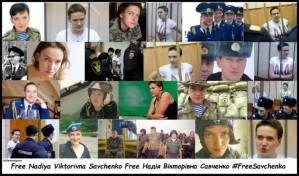
We asked that she demand Nadiya Savchenko’s release, that PACE send a delegation to Russia and that her case be placed on the agenda for the first day of the next PACE session on Jan 26.
There have now been public calls for Nadiya Savchenko’s immediate release from the US State Department, the European Parliament and PACE.
Where next?
Nadiya Savchenko remains in Russian detention and her condition after over a month on hunger strike is worsening by the day.
Russia’s FSB [Security Service] and police have responded to additional attention to Savchenko’s situation by organizing a permanent tail for her lawyers and detaining people and charging one of ‘petty hooliganism’ for sitting in a car outside Savchenko’s place of detention and loudly playing the Ukrainian national anthem.
The Russian pro-Kremlin media are largely silent about Nadiya Savchenko, or mention her hunger strike in connection with other more ‘positive’ details, such as that the Russian Ombudsperson Ella Pamfilova has promised to help facilitate a visit to the SIZO [remand prison] from her sister, Vera Savchenko.
Over the next days, and especially on Jan 26, when the PACE session which Savchenko as newly-elected Ukrainian MP and PACE delegate will be prevented from attending, it is vital that PACE members and the media are made aware of all those details that the Russian authorities are trying to conceal.
Russia has lied about the direct commitment made under the Minsk Protocol regarding prisoners. Asked about the possible release of Nadiya Savchenko and Crimean film director Oleg Sentsov, Russian foreign ministry spokesperson Alexander Lukashevich claimed to see no link between their cases and the Minsk protocol which spoke of prisoners of war.
The Minsk Protocol, as the PACE President noted, speaks of the “immediate release of all hostages and illegally held persons”
Savchenko was captured by Kremlin-backed militants in the Luhansk oblast of Ukraine and taken against her will to Russia where she has been held in detention ever since.
Moscow can intimidate and block the few remaining independent media in Russia but it cannot prevent the international community learning of this manifest breach both of the Minsk protocol and of international law.
PLEASE HELP ensure that the media and your own politicians learn about Nadiya Savchenko’s plight and especially those facts that the Kremlin is most trying to hide.
More details about the case and Nadiya Savchenko’s letter from Jan 12 can be found here
Nadiya Savchenko will not end her hunger strike nor let them break her spirit
Information about the Jan 26 global action: Hope for Nadiya Savchenko: Global Action January 26 #FreeSavchenko
THIS IS NOT ALL
While attention is understandably focused on Nadiya Savchenko, other Ukrainians remain in detention in Russia on falsified charges.
Crimean opponents of Russian annexation Oleg Sentsov and civic activist Oleksandr Kolchenko were arrested in May last year and taken to Moscow where they have been held in detention ever since. There is a very real danger that they could receive 20-year sentences over a non-existent ‘Right Sector terrorist plot’.
More details (which urgently need publicity) here:
Russian secret trial to convict opponents of Crimean annexation
Yury Yatsenko, a young law student from Lviv, is also being held in Russia on totally fabricated charges. See:
Russia’s Geopolitical Prisoners
Public concern over Russia’s imprisonment of former military pilot Nadiya Savchenko has had impact. Every one of us can help ensure that this case, and those of Oleg Sentsov, Oleksandr Kolchenko and Yury Yatsenko are kept in the public eye until they are all released.
We remember
Day of Ukrainian Unity and Remembrance for the First Maidan Victims
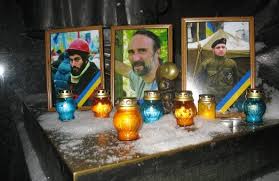
One year ago today two Maidan activists - Serhiy Nihoyan and Mikhail Zhyznevsky - were shot and killed on Hrushevsky St in Kyiv. On that same January 22 - Ukrainian Unity Day [День соборності] Roman Senyk received fatal injuries, dying several days later, and Yury Verbytsky was left to die in a forest after being subjected to horrific torture. Nobody has been held to answer for any of these deaths.

Serhiy Nihoyan was 21 and had served as one of the voluntary defenders of Maidan since December 2013.
Serhiy was a Ukrainian of Armenian origin. His parents had sought refuge in Ukraine from the violence over Nagorno-Karabakh shortly before their son was born.
The video here ‘Our Shevchenko’ was first posted on Dec 22, 2013. Serhiy is seen on Maidan and reading lines from Taras Shevchenko’s poem ‘The Caucuses’.
And glory, freedom’s knights, to you,
Whom God will not forsake.
Keep fighting -- you are sure to win!
God helps you in your fight!
For fame and freedom march with you,
And right is on your side.
https://youtube.com/watch?v=CyFqqstK7e0
Sergei Nihoyan was his parents’ only child. His mother has been seriously ill since his death and it is his father, Harik Nihoyan, who normally visits his grave, close to Bereznovativka, the village near Dnipropetrovsk where he lived with his parents.
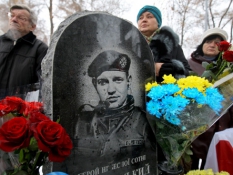
Mikhail Zhyznevsky was 25 and from Belarus. He had come to Ukraine 10 years earlier seeking refuge from persecution. In Ukraine he was active in the nationalist UNA-UNSO movement.
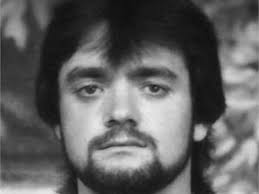
Roman Senyk was 45 and from the Lviv oblast. He died in hospital three days after being shot on Maidan.
Investigation into the killings was first under the control of the Interior Ministry, but has now been taken over by the Prosecutor General’s Office. Serhiy Horbatyuk, head of the department for special investigations within the PGO explained to the Inter Podrobnosti news team:
“In the Interior Ministry, documents were not retained indicating which unit was deployed in which city. Either they weren’t drawn up, or else somebody destroyed them. “

Yury Verbytsky
The 51-year-old Lviv seismologist was abducted from hospital during the early hours of Jan 21 by 10 men in plain clothes. His body was found in a forest outside Kyiv on Jan 23. He had been tortured, suffering horrific injuries, and left to die.
The Interior Ministry’s Central Investigation Department announced in August 2014 that it had concluded its investigation into the abduction of EuroMaidan activists Ihor Lutsenko and Yury Verbytsky . It believes that their abduction was organized by two men who acted with the full support of the former management of the Interior Ministry and Prosecutor General’s Office. An indictment has been drawn up with respect to two men, and another 10 have been placed on the international wanted list. The police have however refused to reveal any names. It was later reported that only one person is actually in custody.
One of the main versions that the investigators have for the killings on Hrushevsky St is that the first deaths were not by chance, but an attempt to frighten off the Maidan supporters”.
It seems, however, that the families of these first victims have long lost any hope of a proper investigation which would ascertain who was responsible for the deaths.
Halya Coynash





